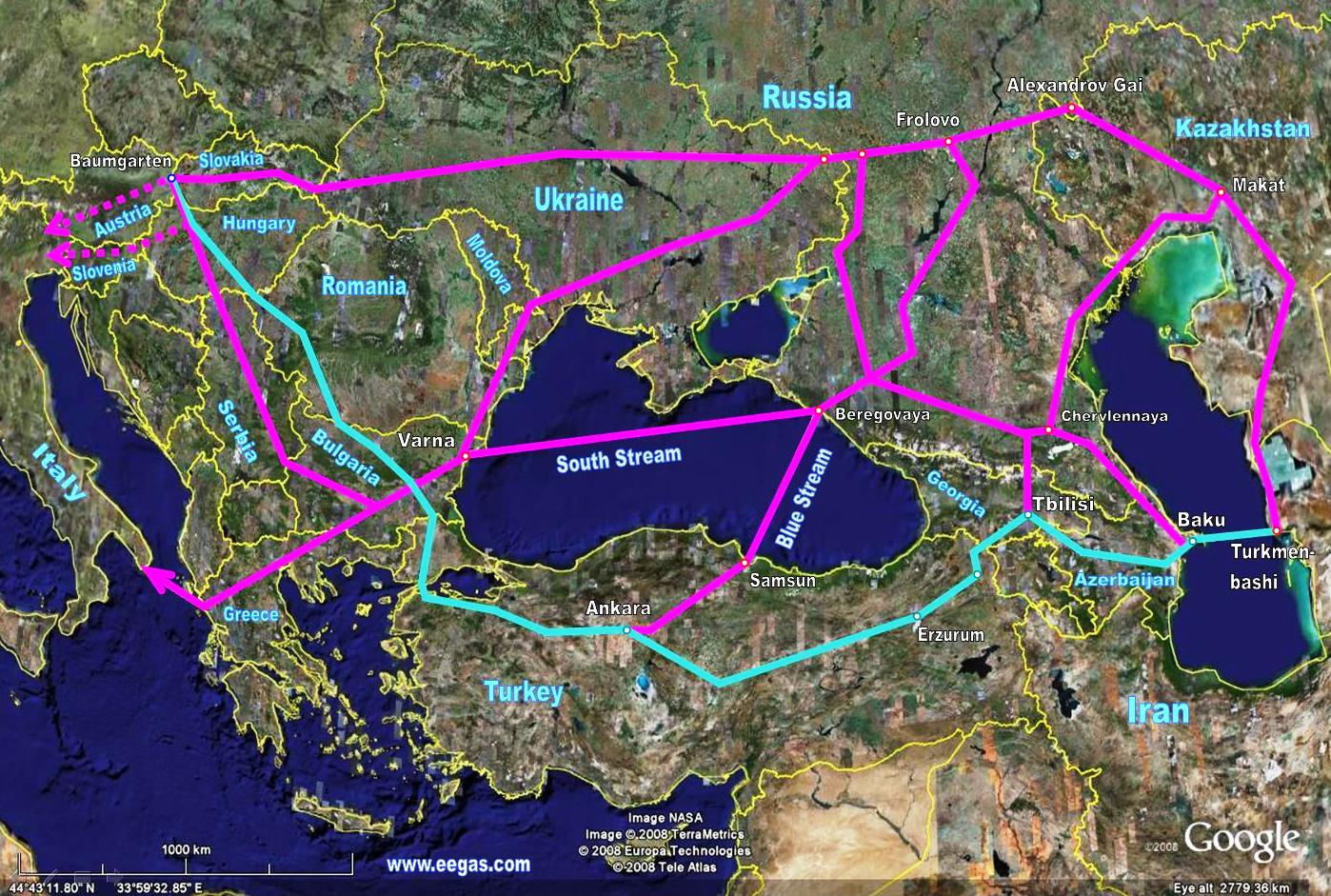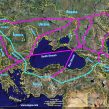
European Union Officially Endorses Trans-Caspian Pipeline to Link Up With Nabucco
Publication: Eurasia Daily Monitor Volume: 8 Issue: 172
By:

Two decisions, adopted in quick succession by the Council of the EU and the European Commission, signify major advances in developing the European Union’s common external policy on energy. The EU has decided to negotiate with Azerbaijan and Turkmenistan on natural gas supplies; and in another, wide-ranging document it has outlined procedures for increased transparency of bilateral energy agreements with third parties, meaning primarily Gazprom.
On September 12, pursuant to a Council decision, the EU mandated the Commission to negotiate a legally binding treaty between the EU, Azerbaijan and Turkmenistan to build a trans-Caspian pipeline for natural gas to Europe. The agreement will provide the framework for constructing a submarine pipeline from Turkmenistan to Azerbaijan, and in turn link this pipeline to the EU-planned Southern Corridor for Caspian gas to Europe.
The discussions will involve tripartite legal commitments between the EU, Turkmenistan, and Azerbaijan; the bilateral arrangements necessary for Turkmenistan and Azerbaijan to build and operate the trans-Caspian pipeline; and the legal and commercial arrangements for filling the pipeline with Turkmen gas en route to Europe (EurActiv, September 12, 13).
This is the first time that the EU has decided to negotiate in support of an infrastructure project on behalf of its member countries, rather than leaving this matter to the exclusive discretion of individual member countries or companies. Its unprecedented decision emphasizes the sense of urgency about implementing the Nabucco pipeline project to reduce dependence on Russia.
The European Commission’s direct involvement raises confidence in the availability of Turkmen gas for the second stage of the Nabucco project (possibly even for Nabucco’s first stage, in modest volumes from early Turkmen off-shore production). That, in turn, strengthens the case for Nabucco’s implementation without further delay, on the strength of Azerbaijani production in the first stage, with substantial Turkmen volumes to be added in the second stage.
The commission uses the generic term, “Corridor,” which also envisages two small-capacity pipelines to Italy (TAP and ITGI), besides the large-capacity Nabucco pipeline bound for Central Europe. In the short to medium term, TAP and ITGI compete against Nabucco over Azerbaijani gas supplies. However, it is only Nabucco with its ample design capacity that can accommodate Turkmen gas as well as Azerbaijani gas. Objectively, the EU’s support for the trans-Caspian pipeline from Turkmenistan is a boost to Nabucco as a self-sustaining project. Implicitly, it underscores Nabucco’s advantages versus its two non-strategic competitors in Azerbaijan (see EDM, August 17-19).
Asking the European Commission to treat these projects “even-handedly” is tantamount to asking it to suspend strategic judgment (moreover, in favor of a consortium 85 percent owned by non-EU companies). Prioritization and sequencing are decisive. The commission’s direct involvement in negotiations on the trans-Caspian pipeline “is the first operational decision” toward implementing the Southern Corridor” (Commission press release, September 12). This sequencing reflects the strategic priority of connecting Turkmenistan via Azerbaijan and Nabucco to Europe.
The announcement from Brussels also offers political support for such gas deliveries to take place. The EU’s direct involvement as a negotiator should in itself provide Azerbaijan and Turkmenistan with a hedge from possible Russian pressures. Turkmenistan would particularly need clarity from Brussels in this regard.
In a parallel move, the European Commission has promulgated a communication on its external energy policy, detailing procedures for the EU and its member states “to act together and speak in one voice” (https://ec.europa.eu/energy/international/security_of_supply/doc, September 8; EurActiv, September 12, 13). In EU practice, a communication tends to precede legislative proposals or to reflect such intent. This communication is unprecedented in the scope of its ambitions. It envisages 43 specific actions, relating in one way or another to security of supply in practically every sector.
On natural gas supply, the document uses imperative language (“must”): “The EU must assist main supplier countries such as Azerbaijan, Turkmenistan, Iraq and others, notably in Central Asia…The proposed agreement on trans-Caspian gas transmission and infrastructure between the EU, Azerbaijan, and Turkmenistan must pave the way for construction of physical infrastructure to supply Turkmen gas across the Caspian Sea.”
The Commission will also insist when necessary to review agreements negotiated by EU countries and companies with third parties; assess the conformity of such agreements with EU laws and supply security goals; and introduce procedures for increased transparency and information exchange on bilateral energy agreements with third parties” (Euractiv, September 12, 13). Gazprom and other Russian companies are mainly being alluded to as third parties.
Moscow has reacted with undisguised irritation and some undiplomatic language to these EU initiatives. Russia’s Foreign Affairs Ministry, Energy Minister Sergei Shmatko, and the ambassador to the EU, Vladimir Chizhov, in convergent statements have countered with the following claims: 1) a trans-Caspian pipeline or any major project cannot be implemented without the approval of all five Caspian riparian countries; 2) this project is environmentally hazardous; 3) the project is “political” [i.e., against Russian interests]; 4) the EU is an “outside” party that should not “interfere” in the Caspian region (Interfax, September 13, 15).
These statements purported to speak on behalf of all five Caspian countries, particularly on the first and second point, citing the Caspian summits of 2007 in Tehran and 2010 in Baku. This is deliberately misleading, however. Azerbaijan has for many years championed the right of any two Caspian countries to build trans-Caspian pipeline links bilaterally. Kazakhstan, after some hesitation, endorsed that position, although less outspokenly.
Turkmenistan has called for a trans-Caspian pipeline, to connect via Azerbaijan with Nabucco, repeatedly in the last 12 months: e.g., during the September 2010 Turkic summit in Istanbul, the November 2010 Caspian summit in Baku (when President Gurbanguly Berdimuhamedov asserted that position in Russian President Dmitry Medvedev’s presence), and during the January 2011 visit of European Commission leaders to Ashgabat.
Moscow’s reference to the 2007 Tehran summit is also inaccurate. During that event, Russia’s then-prime minister Vladimir Putin claimed that trans-Caspian pipelines would be ecologically hazardous due to some “underground mountains” on the seabed. In response, Azerbaijan’s President, Ilham Aliyev, called over his State Oil Company’s octogenarian vice-president for geology, Khoshbakht Yusifzade, who said that he had been working in the Caspian longer than Putin had been alive, and explained in front of the presidents that Putin was wrong (WikiLeaks, report from the US embassy in Baku to the State Department, November 13, 2007).




